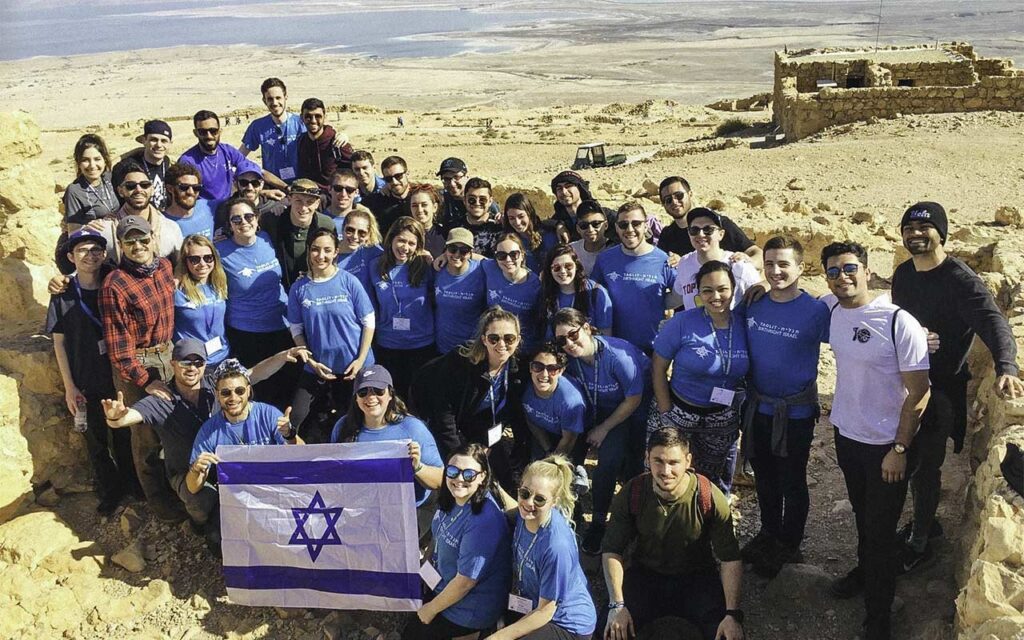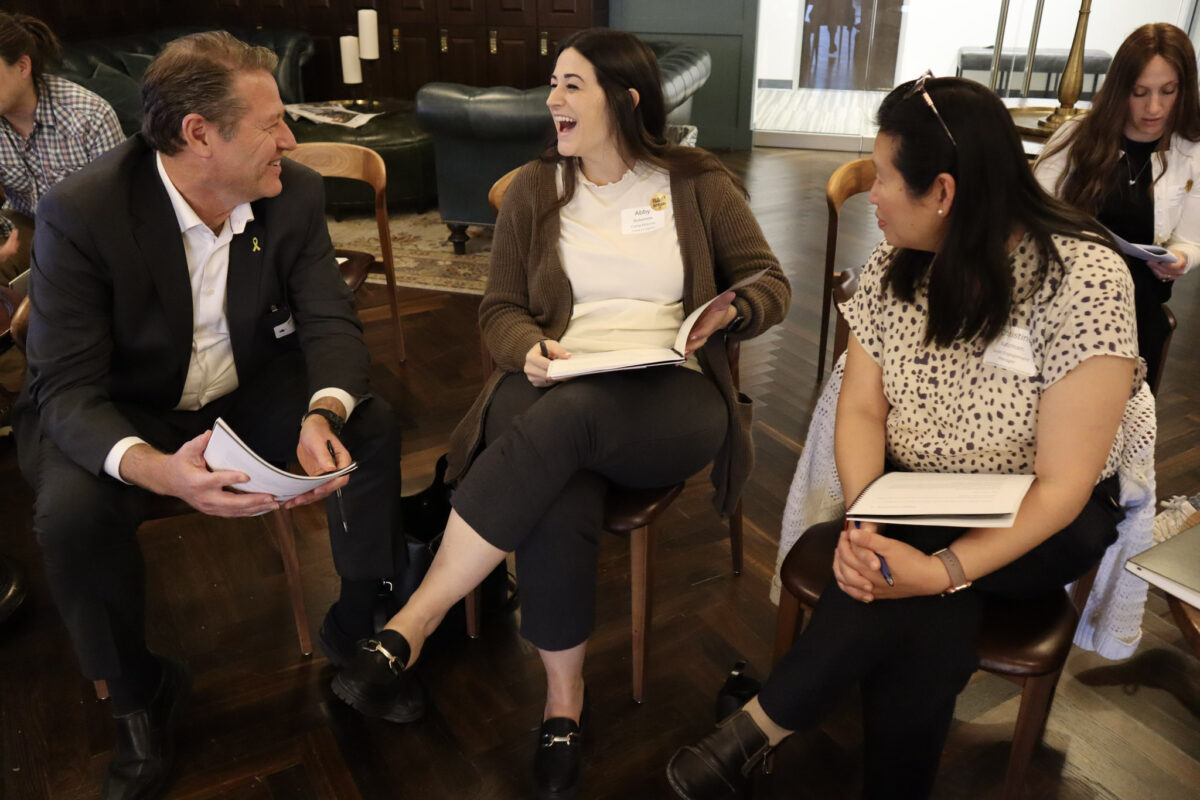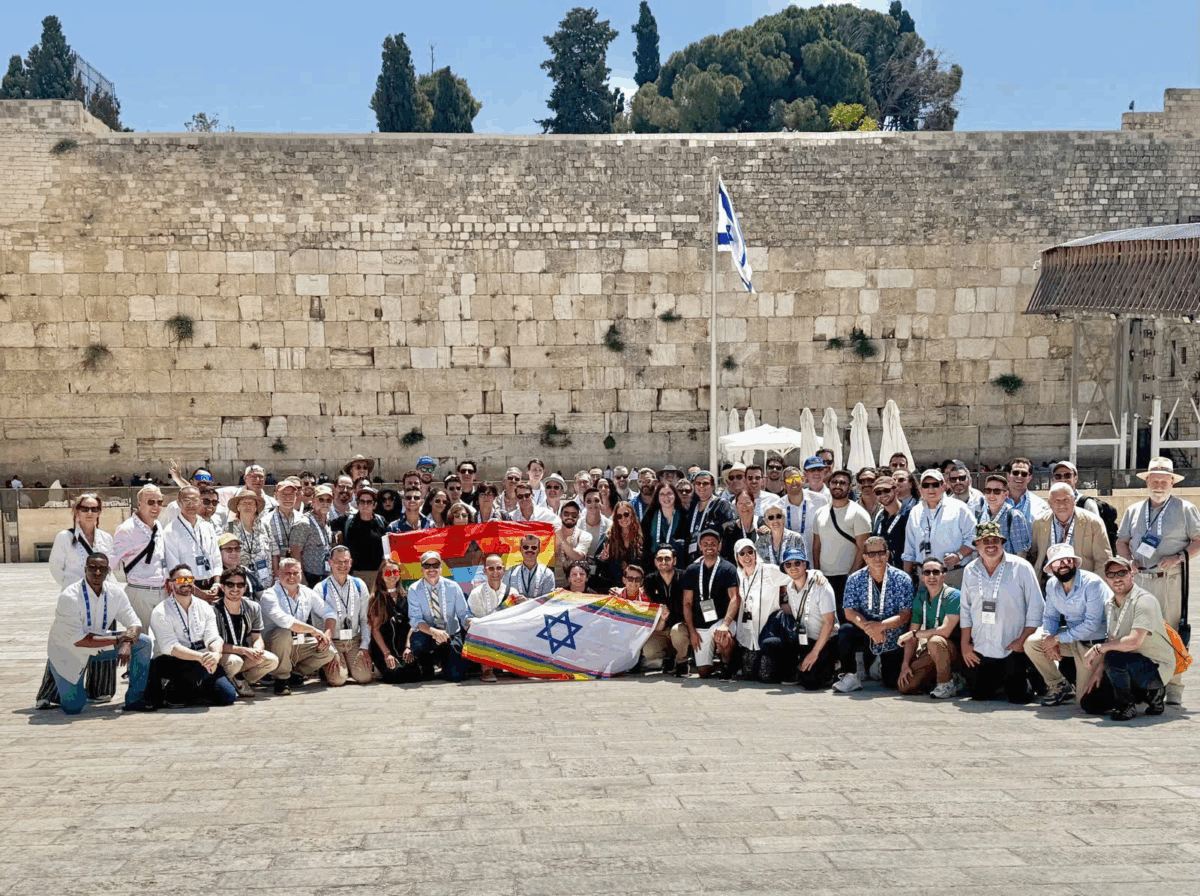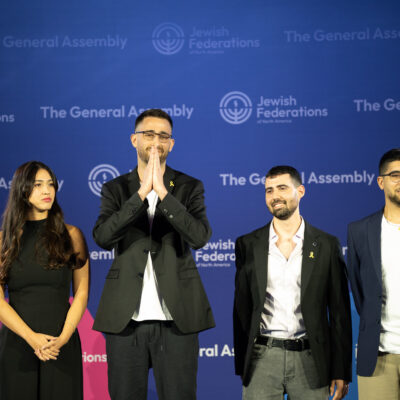Your Daily Phil: U.S. Jewish leaders discuss Gaza war with Israeli foreign minister in New York
Good Wednesday morning.
In today’s edition of Your Daily Phil, we report on yesterday’s meeting between Israeli Foreign Minister Gideon Sa’ar and American Jewish leaders. We examine how Israel trip providers have pivoted this summer in the wake of the Israel-Iran war, interview the founder of the Ne’eman Foundation fundraising organization, which recently marked $100 million transferred from American donors to Israeli nonprofits, and look at the latest FBI hate crime data that finds that Jews remain the most targeted religious group. We feature an opinion piece by Keren E. Fraiman calling on institutional leaders to address a major concern among Israel educators, and one by Kim Newstadt and Jaynie Levinson about designing an event to connect Jewish lay leaders and communal professionals in Cincinnati; plus Miryam Kabakov reflects on the significance of a recent UJA-Federation of New York grant to support Eshel’s work with the Orthodox LGBTQ+ community.
What We’re Watching
The Aspen Institute and the Lauder Family will be hosting a memorial service in Aspen, Colo., at 7 p.m. ET for Leonard Lauder, a trustee of the institute, who died in June at 92.
What You Should Know
Israeli Foreign Minister Gideon Sa’ar met with some two dozen American Jewish leaders in New York City on Tuesday, briefing them on developments in Israel and hearing their concerns, ahead of a speech in the United Nations about the plight of Israeli hostages being held in Gaza, participants told eJewishPhilanthropy’s Judah Ari Gross and Jewish Insider’s Danielle Cohen-Kanik.
Sa’ar’s meeting comes as American Jews are increasingly voicing their concerns about the humanitarian situation in Gaza and as the Israeli government is threatening to expand Israel’s military campaign in the enclave, potentially including a full occupation of the Strip.
“It was not just a briefing, but a serious and constructive exchange with a broad cross-section of American Jewish leaders. There was thoughtful dialogue and real engagement around the complex challenges and opportunities facing Israel and the Jewish people,” William Daroff, CEO of the Conference of Presidents of Major American Jewish Organizations, told eJP. “In light of Minister Sa’ar’s upcoming address to the United Nations Security Council, we also noted the importance of keeping the plight of the hostages visible to the international community.”
Sa’ar spoke to the U.N. Security Council yesterday about the hostages still being held in the Gaza Strip in light of the release of videos showing the emaciated conditions of two Israeli captives, Rom Braslavski and Evyatar David. In his speech, Sa’ar decried the international body’s silence on the issue and criticized the countries that have announced plans to recognize a Palestinian state in September.
The meeting with Sa’ar took place three weeks after Israeli Prime Minister Benjamin Netanyahu visited the United States without meeting American Jewish leaders — his third time in a row forgoing a sit-down with them during a U.S. trip.
“That the minister set aside significant time for this meeting, during a 15-hour visit to the United States, reflects his interest in engaging directly with our community,” Daroff said.
Other participants, who spoke to eJP on condition of anonymity as the meeting was held off the record, said that the topics focused on the burning geopolitical issues of the day, including the war in Gaza, the conflict with Iran in June, Israel’s relationship with the Trump administration and Israel’s public diplomacy efforts.
There were few representatives from American Jewish groups representing more progressive communities, though some of that is a function of the last-minute nature of the meeting, which was only organized the day before it happened. The Reform movement, for instance, was invited but did not send a representative due to scheduling issues.
SUMMER PLANS
Israel trip providers pivot after war with Iran, with some resuming travel, others sending teens abroad

At the start of Israel’s 12-day war with Iran, it seemed that educational travel to Israel would be off the table this summer season. Now, six weeks since a ceasefire took effect, teen and young adult travel programs, particularly among Modern Orthodox providers, have resumed trips to the country, albeit at a lower level. “On July 1, as soon as the airports officially opened to commercial travel, Israel Educational Travel Alliance partners had thousands of participants on the ground,” Anna Langer, vice president for North American Israel strategy at Jewish Federations of North America and acting executive director of the Israel Educational Travel Alliance, told eJewishPhilanthropy’s Nira Dayanim.
Staying strong: According to Simon Amiel, executive director of RootOne, 70% of the teen summer travel participants expected to attend RootOne-affiliated programs are still traveling this summer. Roughly 36% of those participants are attending the “alternative trips” — to Europe or other non-Israel countries — that RootOne added to its offerings for this year only in light of ongoing security concerns. “What we saw was that there was a good amount of resilience among the families,” Amiel told eJP. “There were very few families who, on their own, canceled. It was mostly because they were on programs that were canceled.” He added that Modern Orthodox programs in particular had almost no dropouts. “The real surprise was that of the programs that we are surveying, Modern Orthodox trips, by and large, did not suffer any losses, almost at all,” Amiel said.
MAKING CONNECTIONS
Ne’eman Foundation marks $100 million raised for Israeli causes, credits ‘personal touch’

Over the past decade, the Ne’eman Foundation, a small Israel-based nonprofit, has quietly facilitated the transfer of more than $100 million in charitable donations from donors in North America to organizations in Israel. But rather than call it a “milestone,” foundation founder and CEO Chaim Katz told Judith Sudilovsky for eJewishPhilanthropy that he prefers to look at it as an “important indicator” of the organization’s success and the trust donors have put into the foundation.
Helping the little guy: Founded in 2001 by Katz, the foundation primarily acts as a go-between or “messenger” in bringing donations to Israeli charities, particularly — but not solely — with those operating in West Bank settlements and on the political right. The foundation works specifically with smaller Israeli nonprofits that do not have an “American friends of” affiliate or otherwise lack the resources to fundraise independently in the U.S., he added. Among the roughly 1,400 organizations that the foundation assists are hospitals, educational institutions, organizations supporting children with special needs and community welfare nonprofits. (Until recently, the group did the same for donations from Canada, but its tax-exempt status was revoked last year due to bookkeeping issues and donations to Israeli military-linked causes in contravention of Canadian tax laws.)
DATA-DRIVEN
FBI report: American Jews remain the most targeted religious group

The American Jewish community remains the most targeted religious group, accounting for nearly 70% of all religiously motivated hate crimes in 2024, even as overall hate crimes in the country have decreased, the FBI reported on Tuesday. Hate crimes targeting Jews had plateaued following a sharp increase immediately after the Oct. 7 Hamas terror attack, reports Haley Cohen for eJewishPhilanthropy’s sister publication Jewish Insider.
Not only ‘a Jewish problem’: Ted Deutch, CEO of the American Jewish Committee, called for “leaders of every kind — teachers, law enforcement officers, government officials, business owners [and] university presidents [to] confront antisemitism head-on” in response to the FBI data. “Jews are being targeted not just out of hate, but because some wrongly believe that violence or intimidation is justified by global events,” Deutch said. “This is unacceptable — the targeting of Jews is not a Jewish problem, it is a society-wide issue that demands a society-wide response.”
Read the full report here and sign up for Jewish Insider’s Daily Kickoff here.
STEP UP FOR TEACHERS
The real barrier to Israel education isn’t the conflict. It’s us.

In her conversations with Jewish educators about what makes them reticent to teach about Israel in the classroom, the “one ultimate barrier” they reported was “a lack of institutional and communal support,” writes Keren E. Fraiman, vice president and chief academic officer at Spertus Institute for Jewish Learning and Leadership in Chicago, in an opinion piece for eJewishPhilanthropy. “Even when we address all of the barriers to teaching about the conflict that I identified in my research — education (feeling they know enough to teach this complex, ever changing conflict), pedagogy (feeling they can tackle conversations about controversial issues) and emotions (feeling they can handle highly charged conversations) — our educators cannot be successful without institutional support.”
Have their backs: “Educator after educator that I spoke with during my research, and who I continue to encounter teaching Jewish professionals through the Spertus Institute, expressed variations on the same theme: Their biggest fear was they were going to lose their jobs. They all had stories about feeling censured; about receiving that angry phone call from a parent or a board member who disapproved of the narrative they introduced… One positive model stood out to me. An educator shared that in a previous role she held, every time she received an angry phone call, the principal handled it; as a result, she felt supported and protected to engage in the kinds of nuanced conversations about the conflict her students demanded and deserved. Time and again, I heard from educators that went from supportive systems to other spaces where the support vanished. The result was that they were no longer willing to address the conflict in the classroom. ”
THE MAKING OF ‘THE BIG GATHER’
Before we engage others, we need to engage each other: How Cincinnati’s Jewish leaders came together to strengthen community

“Jewish Cincinnati organizations are essential in creating belonging for families, yet our community has created few intentional spaces for such a wide swath of Cincinnati professionals to come together and build trust. How can we enhance ways to create belonging for Jewish families in Cincinnati if we don’t start with the professionals at the helm of these relationships?” write Kim Newstadt, director of research and learning at the Jewish Foundation of Cincinnati, and Jaynie Levinson, director of community engagement and leadership at the Jewish Federation of Cincinnati, in an opinion piece for eJewishPhilanthropy.
From vision to reality: “[Sixty] professionals from 24 organizations, spanning a wide spectrum of denominations, approaches, and roles came together for ‘The Big Gather’ — a full-day immersive retreat for organizations and professionals who engage families raising young children, designed to enhance community-building in Jewish Cincinnati. Convened by the Jewish Foundation of Cincinnati and Jewish Federation of Cincinnati, and facilitated by the nationally recognized expert team at Assembly, the retreat focused on tools and strategies that center relationships within and across our organizations, inspired by Gather’s thought leadership on relationship-based engagement… More than just a professional development opportunity, The Big Gather has sparked the beginning of a new way of operating — one rooted in relationships, equity and long-term impact.”
SOMEWHERE WE BELONG
Reflecting on safety from a safe room

Miryam Kabakov, co-founder and executive director of Eshel, was initially concerned for her safety when she arrived in Israel as part of a delegation of LGBTQ+ leaders on the Jewish Federations of North America’s Pride Month trip in June; but she was quickly surprised to discover “something I hadn’t felt in the U.S. for a long time: a sense of safety — and more than that, belonging,” she writes in an opinion piece for eJewishPhilanthropy. “I didn’t have to explain or justify my Judaism — not my observance, not my queerness, not my presence. I could simply be. Even as a queer Orthodox Jew, I was safe. I was seen.”
Building community at home: “UJA-Federation of New York recognizes that this kind of safety — a sense of belonging — matters. This summer, they awarded Eshel, the organization I direct, with a grant specifically to address belonging and safety… It will help fund a new program director to launch monthly Jewish text study groups, Shabbat dinners and topical workshops. These initiatives, which will serve as a model for nationwide programming, aim to rebuild connections to Judaism in supportive Jewish communal spaces to help the many who feel alienated after coming out, and especially since the trauma of Oct. 7, 2023.”
Worthy Reads
Expecting More: On its website, the Israeli think tank Atchalta examines the “moral confusion” regarding the deteriorating humanitarian situation in Gaza. “[To] truly understand how we reached this abyss, one must recognize some very painful truths: 1. The situation in Gaza is dire, the number of Palestinian casualties is high, and the population there is living through hell. … 2. The Israeli government has been terribly negligent regarding its humanitarian policy, and this has had severe consequences for the situation in Gaza. … Those who wish Israel well but are critics of its government… are supposed to be the moral backbone of discourse about Israel. They are allowed and even expected to continue leveling harsh and sharp criticism at the Israeli government. At the same time, there is an expectation from them, not from international media, to contribute to a more substantive and complex discourse and prevent the blackening of the foundations of the State of Israel. Some of them still prefer to cleanse their personal conscience.” [Atchalta]
The Gaza Images Now Haunting Israelis: The New Yorker’s Ruth Margalit examines a shift in Israeli public discourse about the humanitarian crisis in Gaza. “Two weeks ago, Israel’s most-watched news broadcast, on the mainstream Channel 12, aired a series of startling images from Gaza. There were photographs of emaciated babies, and of children being trampled as they stood in food lines, holding out empty pots; there were pictures of mothers weeping because they had no way to feed their families. At the end of the segment, Ohad Hemo, the network’s correspondent for Palestinian affairs, concluded, ‘There is hunger in Gaza, and we have to say it loud and clear.’ He was careful to note that his assessment was not influenced by foreign reporting: ‘I speak to Gazans daily. These are people who haven’t eaten in days.’ He went on, ‘The responsibility lies not only with Hamas but also with Israel.’ In much of the world, this sentiment would seem incontrovertible, even obvious. In Israel, it represented a drastic change.” [New Yorker]
Who is This Guy?: New York magazine investigates Matthew Christopher Pietras, who has donated millions of dollars over the years to New York cultural institutions that were all stolen from his affluent employers, including the Soros family. “Some time over the past year, he started telling people he’d gotten a job with an even richer boss — the Qatari royal family. His new employers, he claimed, had given him a generous signing bonus. ‘I said to him, “Matthew, you’re a gay guy who just converted to Judaism. I’m surprised they hired you,”’ one friend says. Pietras was quick to reply, ‘It’s part of their new image.’ The new job helped explain Pietras’s ever-ballooning philanthropy. … Pietras had gone to great lengths to steal from his bosses — he’d impersonated Greg [Soros], fabricated documents, and rerouted fraud alerts from Greg’s phone to his email. But how would he hide a multimillion-dollar lump-sum transfer? … On Wednesday, May 28, a $10 million transfer was routed to the Met from an LLC associated with a property Greg owned. But it was flagged as fraudulent and didn’t go through. … Before [the Met] could figure it out, on Friday, May 30, a housekeeper found Pietras dead in his apartment.” [NewYork]
Word on the Street
The board of the Montreal Pride event has reversed its decision to bar two Canadian Jewish organizations — Ga’ava and the Centre for Israel and Jewish Affairs — from participating in the parade on Sunday; the chair of the board has also resigned over the issue…
The American Jewish Committee ran a full-page ad in The New York Times today with images of hostage Evyatar David — a photo taken before his capture opposite a still from the recent video released by Hamas showing David over 660 days into captivity, looking severely emaciated and haggard. AJC CEO Ted Deutch said the organization chose to take out the ad due to “selective coverage from media outlets” that “continues to feed a biased narrative that too often ignores Israeli and Jewish suffering.” The ad will also run in the paper’s Sunday edition…
Missouri police are investigating as a possible hate crime a case of arson near St. Louis, in which the Jewish family of an IDF veteran living in the area was targeted, as evident from graffiti reading “Death to the IDF” that was found at the scene…
Brandeis University announced a restructuring of its academic programs into four schools: The School of Arts, Humanities and Culture, The School of Business and Economics, The School of Science, Engineering and Technology, The School of Social Sciences and Social Policy. With enrollment down and finances squeezed, Brandeis is merging its graduate professional programs into its liberal arts curriculum under the helm of Arthur Levine, who transitioned from an interim president role to president in late June…
Hillel International and Secure Community Network in a joint statement urged all universities to follow Harvard’s lead in covering security costs for their campus’ Hillel…
The Department of Homeland Security, which oversees the Federal Emergency Management Agency, quietly removed a requirement for grant applicants to certify they will not engage in a commercial boycott of Israel in order to be eligible for funding…
A recent survey by the nonprofit Trust for Public Land found that roughly 28 million children in the U.S. don’t have ready access to parks or green spaces, which can have significant health ramifications…
The Real Deal examines the legal battles being waged within the Chetrit real estate family…
The Australian Jewish Gandel family said it would continue to fund Australia’s National Gallery of Victoria, which was targeted last week by anti-Israel protesters because of the Gandel’s support…
Haaretz spotlights a new exhibition at the Museum of the Southern Jewish Experience about New Orleans’ long-shuttered Home for Jewish Widows and Orphans…
The NFL struck a major deal with Disney for a 10% stake in ESPN, the entities announced yesterday. Robert Kraft, owner of the New England Patriots and chair of the NFL’s media committee, said in an interview that the equity piece of the deal is “really a commitment beyond whatever the contract is” and could allow the league to raise the salary cap for players…
Dallas-based businessman and philanthropist Morton Meyerson, who spearheaded the fundraising campaign for the city’s symphony hall, which is named for him, died yesterday at 87…
Major Gifts
Arnold Ventures has announced 50 grants totaling $15 million to support research on criminal justice and community safety…
Transitions
Keren E. Fraiman has been named vice president of Spertus Institute for Jewish Learning and Leadership; she also retains the titles of chief academic officer and professor of Israel studies…
Pic of the Day

JCC Maccabi
Members of Team Israel enter the opening ceremony of the inaugural JCC Maccabi Campus Games on Monday night in Pittsburgh.
Some 2,000 teen athletes are participating in the weeklong event, with delegations coming from 51 communities around the world, including Israel, Ukraine, Mexico and Great Britain. The games this year are being hosted in partnership between JCC Maccabi, JCC of Greater Pittsburgh and the University of Pittsburgh. Additional games are being held in Tucson, Ariz.
Birthdays

Vice chair of the Jewish Public Affairs Committee of California and a trustee of JFNA, Susie Sorkin…
Los Angeles-based partner at the Jaffe Family Law Group, Daniel J. Jaffe… E-sports executive and casino owner, he is a three-time bracelet winner at the World Series of Poker, Lyle Berman… Professor emerita and former dean at Bar-Ilan University, Malka Elisheva Schaps… Film director, television director, producer and screenwriter, Brian Michael Levant… Austrian businessman Martin Schlaff… Former state treasurer of Virginia and then Virginia secretary of finance, she is now a gourmet popcorn manufacturer, Jody Moses Wagner… Professor of public diplomacy at The Fletcher School of Tufts University, she was formerly undersecretary of state for public diplomacy, Tara D. Sonenshine… Professor of psychiatry at the George Washington University Medical Center, Alan J. Lipman, Ph.D…. Israeli diplomat, he served as Israel’s consul general in New York City between 2000 and 2004, Alon Pinkas… NASA astronaut who spent 198 days on the International Space Station, he brought 18 bagels from his family’s bagel store in Montreal into space, Gregory Chamitoff… Chair of White & Case’s white collar practice group, Joel M. Cohen… Executive director of public affairs and policy communications at the American Council on Education, Jonathan Riskind… CEO of Elluminate (formerly known as the Jewish Women’s Foundation of New York), Melanie Roth Gorelick… Television and radio sports anchor on ESPN and ABC, he was one-half of the “Mike & Mike” team but now hosts his own ESPN morning program, Mike Greenberg… Chief economist at The Burning Glass Institute, Gad Levanon Ph.D…. Law professor and associate dean at Michigan State University College of Law, David Blankfein-Tabachnick… Former boxing commentator and co-host of ESPN’s “This Just In,” he is soon to host a major boxing match on Netflix, Yiddish-speaking Max Kellerman … Co-founder and former CEO of Uber, Travis Kalanick… Founder and CEO at Climb Together which helps prepare people from low-income backgrounds for entry level jobs, Nitzan Pelman… Actress, director, producer and screenwriter, Soleil Moon Frye… Screenwriter and television producer, he is best known for creating and executive producing the Fox teen drama “The O.C.,” Joshua Ian Schwartz… PR consultant and managing director at Actum, Jeffrey Lerner… Chief creative and culture officer at an eponymous firm, Rachel Gogel… Member of the New York State Assembly, Simcha Eichenstein… Winner of two gold medals in swimming at the 2008 Summer Olympics in Beijing, he is now CEO of Gather Campgrounds north of Austin, Texas, Garrett Weber-Gale… Director of strategy and policy at K2 Space Corporation, he is also a non-resident senior fellow at the Atlantic Council, Corey A. Jacobson… Communications and leadership consultant, company trainer and international speaker, Jessica I. Goldberg… Reporter at San Antonio Express-News, Elizabeth Teitz… School safety activist and former student at Marjory Stoneman Douglas High School, Hunter Pollack…


 Add EJP on Google
Add EJP on Google






